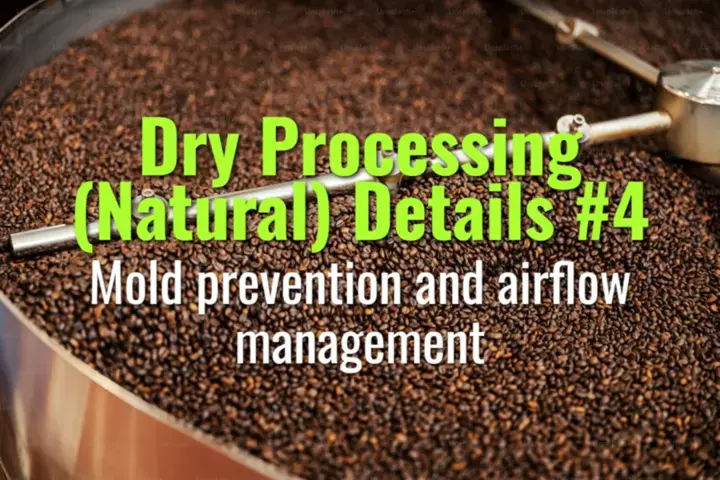Mold prevention and airflow management
This topic explains how mold prevention and airflow management are critical in natural (dry) coffee processing, and the best practices farmers use to keep beans clean, safe, and high-quality.
- Coffee Basics Nerds
- 2 min read
Article 4 of 12 in Dry Processing (Natural) Details/

Why Mold Prevention Matters
- Coffee cherries dry with pulp and mucilage intact, creating high sugar and moisture content.
- If airflow is inadequate or drying is uneven, mold spores develop, leading to defects and rejection in specialty markets.
- Mold contamination can produce mycotoxins (e.g., ochratoxin A), a food safety hazard.
Role of Airflow in Drying
- Proper airflow ensures even moisture loss and prevents localized fermentation pockets.
- Still air = heat buildup, excess humidity, and ideal mold conditions.
- Continuous air circulation is especially important in humid or rainy climates.
Best Practices for Mold Prevention
1. Drying Surfaces
- Use raised beds with mesh for airflow above and below.
- Keep layers thin (3–5 cm) to avoid clumping.
2. Turning Frequency
- Turn cherries regularly (every 30–60 min early on, later every few hours).
- Prevents fermentation hotspots and uneven drying.
3. Ventilation & Covering
- Solar dryers or tunnels with vents improve airflow while protecting from rain.
- Shade nets reduce heat stress during midday sun.
4. Moisture Monitoring
- Track progress with moisture meters.
- Critical zone: 20–30% moisture → highest risk for mold growth.
5. Sanitation
- Clean drying beds and patios between harvests.
- Remove any contaminated cherries immediately.
Challenges
- Tropical humidity makes airflow management difficult.
- Infrastructure costs for solar dryers or raised beds may be high for smallholders.
- Labor required for frequent turning.
Quality Impacts
- Good airflow: Clean, fruity naturals with stable storage quality.
- Poor airflow/mold contamination: Musty, earthy, or dirty cups, market rejection.
Lasting Importance
Mold prevention and airflow management are non-negotiable in natural processing. By ensuring proper drying conditions, farmers protect flavor integrity, food safety, and market value, securing their place in specialty coffee supply chains.
You might also like:
- Tags:
- Lasting Importance
- Best Practices
- Specialty Coffee
- Food Safety
- Matters Coffee
- Specialty Markets
- Moisture Content
- Uneven Drying
- Flavor Integrity
- Raised Beds
- Natural Processing
- Market Value
- Solar Dryers
- Coffee Supply
- Risk Mold
- Moisture Meters
- Mold Growth
- Turning Frequency
- Quality Impacts
- Frequent Turning
- Supply Chains
- Humid Rainy
- High Sugar
- Drying Beds
- Shade Nets
- Heat Buildup
- Drying Conditions
- Mold Contamination
- Non Negotiable
- Rainy Climates
- Beds Patios
- Stable Storage
- Cherries Dry
- Dryers Tunnels